EU and Bulgaria 2011: What is going to happen?
Ralitsa Kovacheva, January 4, 2011
 An important year for the European Union and Bulgaria has started, because key decisions on some of the most important problems of the Union are to be taken and others, which have been difficult to take last year, are to be implemented.
An important year for the European Union and Bulgaria has started, because key decisions on some of the most important problems of the Union are to be taken and others, which have been difficult to take last year, are to be implemented.
Perhaps the biggest change is in the field of EU's economic and financial governance: for the first time in the history of the Union joint activities will be implemented in areas, hitherto being entirely a prerogative of national authorities.
In the first half of the year the so called European semester will be held. The semester is in fact monitoring on Member States' economic and budgetary policies, aiming their synchronization before the approval of national budgets in the second half of the year.
Except the semester, the European Commission has already made proposals 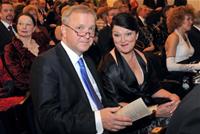 to strengthen the Stability and Growth Pact and on the macroeconomic surveillance at EU level in order to detect potential imbalances. A "special regime" is being introduced for the euro area, by offering more rigorous surveillance and financial sanctions for countries that do not comply with the new rules. It is expected the entire package of proposals to be finally approved by mid-2011.
to strengthen the Stability and Growth Pact and on the macroeconomic surveillance at EU level in order to detect potential imbalances. A "special regime" is being introduced for the euro area, by offering more rigorous surveillance and financial sanctions for countries that do not comply with the new rules. It is expected the entire package of proposals to be finally approved by mid-2011.
 The euro area is beginning the year with huge debts and one more member - Estonia. EU's best performer, in terms of financial discipline and reforms, had a bad luck to join the eurozone at the height of the debt crisis, which will continue to spread in 2011.
The euro area is beginning the year with huge debts and one more member - Estonia. EU's best performer, in terms of financial discipline and reforms, had a bad luck to join the eurozone at the height of the debt crisis, which will continue to spread in 2011.
According to an analysis of the Italian UniCredit bank, cited by the Financial Times newspaper, in 2011 the eurozone will have to refinance or repay 560 billion euro - this is 45 billion euro more than in 2010 and is a record high since the creation of the euro so far. Only Portugal accounts for 20 billion of the overall amount, so analysts say the country will follow Ireland and Greece, and will resort to the bail-out fund for the euro area. According to the forecast, throughout the entire 2011 euro area governments will try to borrow up to 925 billion euro.
At their last meeting in December, European leaders refused to discuss the 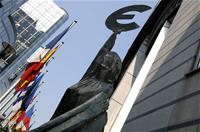 issue of increasing the size of the rescue fund, but probably this issue will be raised again this year. Meanwhile, Member States have agreed to create a permanent fund (European Stability Mechanism) to be enacted after 2013. This spring more clarity is expected with regard to the specific design and functioning of the future mechanism. The main idea, however, is to ensure that private creditors will share the risk and that there will be an opportunity to restructure the debt of the troubled countries.
issue of increasing the size of the rescue fund, but probably this issue will be raised again this year. Meanwhile, Member States have agreed to create a permanent fund (European Stability Mechanism) to be enacted after 2013. This spring more clarity is expected with regard to the specific design and functioning of the future mechanism. The main idea, however, is to ensure that private creditors will share the risk and that there will be an opportunity to restructure the debt of the troubled countries.
Since the beginning of this year the new architecture of the European financial supervision is getting operational. It includes two mega authorities: The European Board for Systemic Risk (EBSR) and the European Supervisory Authorities (ESAs) - the European Banking Authority (EBA, in London), the European Insurance and Occupational Pensions Authority (EIOPA, in Paris) and the European Securities and Markets Authority (ESMA, in Frankfurt).
 During the first five years the president of the European Central Bank will also be a president of EBSR. In the next 10 months the position will be held by Jean-Claude Trichet, but the Frenchman's term expires at the end of October. His most probable successor is considered to be Axel Weber - President of Bundesbank and a member of European Central Bank's Governing Council.
During the first five years the president of the European Central Bank will also be a president of EBSR. In the next 10 months the position will be held by Jean-Claude Trichet, but the Frenchman's term expires at the end of October. His most probable successor is considered to be Axel Weber - President of Bundesbank and a member of European Central Bank's Governing Council.
Another big novelty for the EU is the launch of the European External Action Service. The establishment of the new authority, embedded in the Lisbon Treaty, went through many ups and downs because of disputes between the European Parliament, the Commission and the Council. Eventually, a compromise was found and the Service, headed by EU's High Representative for Foreign Affairs and Security Policy, baroness Catherine Ashton, has already appointed its first ambassadors and directors. Former Bulgarian Prime Minister Philip Dimitrov has been appointed an EU ambassador to Georgia.
Service. The establishment of the new authority, embedded in the Lisbon Treaty, went through many ups and downs because of disputes between the European Parliament, the Commission and the Council. Eventually, a compromise was found and the Service, headed by EU's High Representative for Foreign Affairs and Security Policy, baroness Catherine Ashton, has already appointed its first ambassadors and directors. Former Bulgarian Prime Minister Philip Dimitrov has been appointed an EU ambassador to Georgia.
Since last fall the first European Council devoted solely to foreign policy was held, in February 2011 will be held the first EU summit dedicated on energy policy. It would be interesting to see if at that forum Bulgaria will finally put formally its request, the bank guarantees which EU Member States will have to take from European financial institutions to realise the Nabucco project not to be calculated in their budget deficits.
 The Union entered 2011 under the Hungarian Presidency. The country is under severe criticism for a controversial media law passed late last year, according to which all media will be subjected to Viktor Orban's ruling party Fidesz. Western media even wrote about “putinization” of Hungary. Meanwhile, the right-wing government of Orban has literally liquidated the pension reform by forcing people to decide whether to keep their state pensions and give up their private pension savings to the state, or lose the right to a state pension, although they had contributed with their payments and to keep only their pre-funded accounts.
The Union entered 2011 under the Hungarian Presidency. The country is under severe criticism for a controversial media law passed late last year, according to which all media will be subjected to Viktor Orban's ruling party Fidesz. Western media even wrote about “putinization” of Hungary. Meanwhile, the right-wing government of Orban has literally liquidated the pension reform by forcing people to decide whether to keep their state pensions and give up their private pension savings to the state, or lose the right to a state pension, although they had contributed with their payments and to keep only their pre-funded accounts.
Budapest may have a chance under its Presidency the negotiations with Croatia to be concluded. Zagreb is only 7 chapters away from EU membership, moreover it has already closed the chapter, considered to be the most difficult - "Rule of law, freedoms and security." The Hungarian Presidency, however, has to give up the hope to "welcome" Bulgaria and Romania into the Schengen area, because most likely the decision for their accession will be postponed to the autumn of 2011.
The reason is, that more and more EU Member States want (as expressed in plain text by the interior ministers of France and Germany) to wait for European Commission's annual report under the CVM in the field of justice and home affairs. The news in the last days of 2010 was particularly bad for Bulgarian government's image in the year of presidential and local elections.
The elections seem to be among the most important issues for the country in 2011. Although a very important condition for them is already a fact: with the votes of the ruling majority and its supporters, the parliament approved the Election Code, 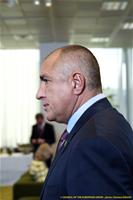 which was harshly criticised by NGOs for reducing rather than ensuring citizens' voting rights.
which was harshly criticised by NGOs for reducing rather than ensuring citizens' voting rights.
Another serious challenge for Bulgaria will be to maintain fiscal stability and achieve economic growth. A forecast of 3.6% economic growth is envisaged in Budget 2011, but this is too optimistic, compared to the forecasts of the European Commission and the IMF about a growth of 2.6%. The ambitious goal is the budget deficit to be kept within the 3% threshold, required by the Stability and Growth Pact, despite the existence of an excessive deficit at the moment.
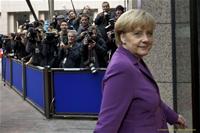 Elections for local authorities are to be held in several provinces in Germany too. They will be a tough test for Chancellor Angela Merkel, as predicted by Der Spiegel magazine, mostly because of the collapsing rates of CDU's coalition partner - the Free Democrats Party and personally of Foreign Minister Guido Westerwelle. 2010 was a hard one for Ms Merkel, who was accused, on the one hand, of indecisiveness and non-European thinking and, on the other - that Germany had to pay with German taxpayers' money for the “saving” of troubled euro area countries.
Elections for local authorities are to be held in several provinces in Germany too. They will be a tough test for Chancellor Angela Merkel, as predicted by Der Spiegel magazine, mostly because of the collapsing rates of CDU's coalition partner - the Free Democrats Party and personally of Foreign Minister Guido Westerwelle. 2010 was a hard one for Ms Merkel, who was accused, on the one hand, of indecisiveness and non-European thinking and, on the other - that Germany had to pay with German taxpayers' money for the “saving” of troubled euro area countries.
This bifurcation between the European ideals and national priorities will mark the most important topics in the EU this year too. Moreover, the Union will begin the debate on the next multiannual financial framework for 2014-2020. What is clear by now is that the debate will be heavy, because some principle decisions have to be taken, such as on the future of the agricultural and cohesion policy, on the size of EU's budget and on the possible new sources of own revenue in EU's budget. British 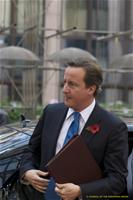 Prime Minister David Cameron has already managed to infuriate a lot of people in Brussels and Strasbourg by offering practically a freezing of the budget for the next financial period. The proposal has been supported by four other Member States: the Netherlands, Germany, France and Finland.
Prime Minister David Cameron has already managed to infuriate a lot of people in Brussels and Strasbourg by offering practically a freezing of the budget for the next financial period. The proposal has been supported by four other Member States: the Netherlands, Germany, France and Finland.
These are some of the major topics and events in the EU, which are forthcoming in 2011. euinside's team will keep you informed about these issues and about everything unexpected, important and interesting, which is happening in Europe (and not only) throughout the year.